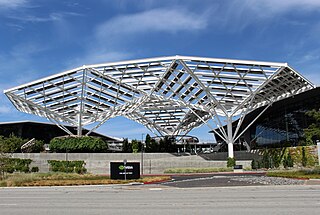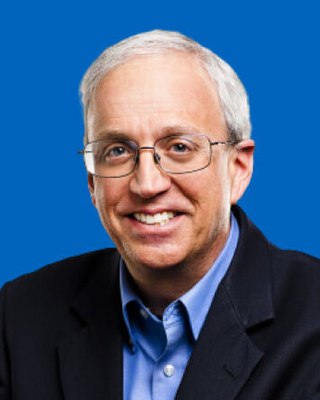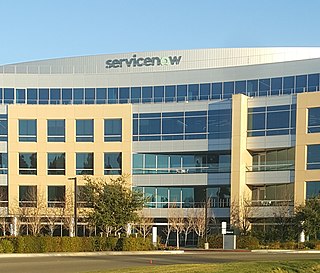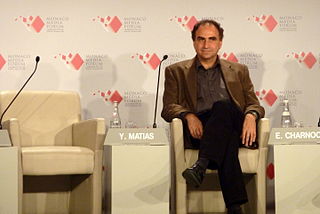Related Research Articles

Nvidia Corporation is an American multinational corporation and technology company headquartered in Santa Clara, California, and incorporated in Delaware. It is a software and fabless company which designs and supplies graphics processing units (GPUs), application programming interfaces (APIs) for data science and high-performance computing, as well as system on a chip units (SoCs) for the mobile computing and automotive market. Nvidia is also a dominant supplier of artificial intelligence (AI) hardware and software.

David A. Bader is a Distinguished Professor and Director of the Institute for Data Science at the New Jersey Institute of Technology. Previously, he served as the Chair of the Georgia Institute of Technology School of Computational Science & Engineering, where he was also a founding professor, and the executive director of High-Performance Computing at the Georgia Tech College of Computing. In 2007, he was named the first director of the Sony Toshiba IBM Center of Competence for the Cell Processor at Georgia Tech.

Daphne Koller is an Israeli-American computer scientist. She was a professor in the department of computer science at Stanford University and a MacArthur Foundation fellowship recipient. She is one of the founders of Coursera, an online education platform. Her general research area is artificial intelligence and its applications in the biomedical sciences. Koller was featured in a 2004 article by MIT Technology Review titled "10 Emerging Technologies That Will Change Your World" concerning the topic of Bayesian machine learning.

William James Dally is an American computer scientist and educator. He is the chief scientist and senior vice president at Nvidia and was previously a professor of Electrical Engineering and Computer Science at Stanford University and MIT. Since 2021, he has been a member of the President's Council of Advisors on Science and Technology (PCAST).

ServiceNow, Inc. is an American software company based in Santa Clara, California, that develops a cloud computing platform to help companies manage digital workflows for enterprise operations. Founded in 2003 by Fred Luddy, ServiceNow is listed on the New York Stock Exchange and is a constituent of the Russell 1000 Index and S&P 500 Index. In 2018, Forbes magazine named it number one on its list of the world's most innovative companies.

Yossi Matias is an Israeli-American computer scientist, entrepreneur and Google executive. Matias is Vice President, Engineering & Research at Google, and the founding managing director of Google's Center in Israel. He is on the leadership team of Google's Research, the global exec lead overseeing Google’s Health AI, Crisis Response and Climate AI efforts, and leads efforts in Conversational AI. For over a decade he was on the leadership team of Google’s Search, building and leading efforts including Google Trends, Google Autocomplete, Search Console, and Search experiences in weather, sports, dictionaries and more. In 2024 Matias move to Silicon Valley to head Google Research, the company’s global research activity.

Jeffrey Adgate "Jeff" Dean is an American computer scientist and software engineer. Since 2018, he has been the lead of Google AI. He was appointed Google's chief scientist in 2023 after the merger of DeepMind and Google Brain into Google DeepMind.

Oren Etzioni is Professor Emeritus of computer science, and founding CEO of the Allen Institute for Artificial Intelligence (AI2). Etzioni is the founder and CEO of TrueMedia.org, a non-profit dedicated to fighting political deepfakes, which launched in April 2024. Etzioni is a Technical Director of the AI2 Incubator, and a venture partner at the Madrona Venture Group.

Fei-Fei Li is a Chinese-American computer scientist, known for establishing ImageNet, the dataset that enabled rapid advances in computer vision in the 2010s. She is the Sequoia Capital professor of computer science at Stanford University and former board director at Twitter. Li is a co-director of the Stanford Institute for Human-Centered Artificial Intelligence and a co-director of the Stanford Vision and Learning Lab. She served as the director of the Stanford Artificial Intelligence Laboratory from 2013 to 2018.

Eric Poe Xing is an American computer scientist whose research spans machine learning, computational biology, and statistical methodology. Xing is founding President of the world’s first artificial intelligence university, Mohamed bin Zayed University of Artificial Intelligence (MBZUAI).
Snowflake Inc. is an American cloud-based data storage company. Headquartered in Bozeman, Montana, it operates a platform that allows for data analysis and simultaneous access of data sets with minimal latency. It operates on Amazon Web Services, Microsoft Azure, and Google Cloud Platform. As of November 2024, the company had 10,618 customers, including 800+ members of the Forbes Global 2000, and processed 4.2 billion daily queries across its platform.
An AI accelerator, deep learning processor or neural processing unit (NPU) is a class of specialized hardware accelerator or computer system designed to accelerate artificial intelligence and machine learning applications, including artificial neural networks and computer vision. Typical applications include algorithms for robotics, Internet of Things, and other data-intensive or sensor-driven tasks. They are often manycore designs and generally focus on low-precision arithmetic, novel dataflow architectures or in-memory computing capability. As of 2024, a typical AI integrated circuit chip contains tens of billions of MOSFETs.
The cTuning Foundation is a global non-profit organization developing a common methodology and open-source tools to support sustainable, collaborative and reproducible research in Computer science and organize and automate artifact evaluation and reproducibility inititiaves at machine learning and systems conferences and journals.
The Association for Computing Machinery SIGARCH Maurice Wilkes Award is given annually for outstanding contribution to computer architecture by a young computer scientist or engineer; "young" defined as having a career that started within the last 20 years. The award is named after Maurice Wilkes, a computer scientist credited with several important developments in computing such as microprogramming. The award is presented at the International Symposium on Computer Architecture. Prior recipients include:

Jacob O. Wobbrock is a Professor in the University of Washington Information School and, by courtesy, in the Paul G. Allen School of Computer Science & Engineering at the University of Washington. He is Director of the ACE Lab, Associate Director and founding Co-Director Emeritus of the CREATE research center, and a founding member of the DUB Group and the MHCI+D degree program.
Animashree (Anima) Anandkumar is the Bren Professor of Computing at California Institute of Technology. Previously, she was a senior director of Machine Learning research at NVIDIA and a principal scientist at Amazon Web Services. Her research considers tensor-algebraic methods, deep learning and non-convex problems.

Michael Bronstein is an Israeli computer scientist and entrepreneur. He is a computer science professor at the University of Oxford and scientific director of Aithyra Institute at the Vienna Biocenter in Austria.
Karin Strauss is a Brazilian-American computer engineer, a senior principal research manager at Microsoft Research, and an affiliate professor in the Paul G. Allen School of Computer Science and Engineering at the University of Washington. Her research concerns computer architecture, green computing, and unconventional computing including DNA digital data storage.
Devaki Raj, who grew up in Lexington, Massachusetts, is chief digital and AI officer in the strategy office at Saab, Inc. and CEO and co-founder of CrowdAI.
Byron Boots is an American professor of machine learning and robotics. He is the Amazon Professor of Machine Learning at the University of Washington (UW). Boots is also the co-founder and chief executive officer of Overland AI, a technology startup.
References
- 1 2 Schlosser, Kurt (2019-12-04). "Geek of the Week: Luis Ceze of Univ. of Washington and OctoML driven by 'intellectual excitement'". GeekWire. Retrieved 2023-12-15.
- 1 2 3 Cosgrove, Emma (2024-09-26). "Nvidia continues acquisition streak with OctoAI". Business Insider. Retrieved 2024-09-26.
- ↑ Communications, Grainger Engineering Office of Marketing and. "Luis Ceze". cs.illinois.edu. Retrieved 2023-12-14.
- ↑ Chen, Tianqi; Moreau, Thierry; Jiang, Ziheng; Zheng, Lianmin; Yan, Eddie; Cowan, Meghan; Shen, Haichen; Wang, Leyuan; Hu, Yuwei; Ceze, Luis; Guestrin, Carlos; Krishnamurthy, Arvind (2018-10-08). "TVM: an automated end-to-end optimizing compiler for deep learning". Proceedings of the 13th USENIX Conference on Operating Systems Design and Implementation. OSDI'18. USA: USENIX Association: 579–594. arXiv: 1802.04799 . ISBN 978-1-931971-47-8.
- ↑ "UW, Microsoft claim big breakthrough with data storage using DNA". The Seattle Times. 2016-07-07. Retrieved 2023-12-15.
- ↑ Cuthbertson, Anthony (2016-04-15). "DNA Storage Could Make Data Centers Obsolete". Newsweek. Retrieved 2023-12-15.
- ↑ Markoff, John (2015-12-03). "Data Storage on DNA Can Keep It Safe for Centuries". The New York Times. Retrieved 2023-12-15.
- ↑ "Luis Ceze | CRISP". crisp.engineering.virginia.edu. Retrieved 2023-12-15.
- ↑ "The i-acoma group at University of Illinois at Urbana-Champaign - Graduated Students". iacoma.cs.uiuc.edu. Retrieved 2023-12-15.
- ↑ Ceze, Luis H. (2007). "Bulk Operation and Data Coloring for Multiprocessor Programmability". Illinois Digital Environment for Access to Learning and Scholarship. hdl:2142/11363.
- ↑ "New Deep Learning Startup, OctoML, Launches to Automate Deployment of Secure and Efficient Deep Learning to Cloud and Edge". www.businesswire.com. 2019-10-23. Retrieved 2023-12-14.
- ↑ Lardinois, Frederic (2023-06-14). "OctoML launches OctoAI, a self-optimizing compute service for AI". TechCrunch. Retrieved 2023-12-14.
- 1 2 Soper, Taylor (2024-01-05). "Here's why Seattle startup OctoML changed its name to OctoAI". GeekWire. Retrieved 2024-09-17.
- ↑ Yeung, Ken (2024-04-02). "OctoAI launches OctoStack for enterprises to customize, deploy private AI models". VentureBeat. Retrieved 2024-09-17.
- ↑ Gardizy, Anissa; Holmes, Aaron; Palazzolo, Stephanie (2024-09-17). "Nvidia Recently Discussed Acquiring Software Startup OctoAI for $165 Million". The Information. Retrieved 2024-09-17.
- ↑ Schlossler, Kurt (2019-12-04). "Geek of the Week: Luis Ceze of Univ. of Washington and OctoML driven by 'intellectual excitement'". GeekWire. Retrieved 2024-09-17.
- ↑ "Luis H Ceze". awards.acm.org. Retrieved 2023-12-14.
- ↑ "NSF Award Search: Award # 0846004 - CAREER: Deterministic Shared Memory Multiprocessing: Vision, Architecture, and Impact on Programmability". www.nsf.gov. Retrieved 2023-12-15.
- ↑ "Fellows Database". sloan.org. Retrieved 2023-12-15.
- ↑ "IEEE TCCA Young Computer Architect Award – TCCA" . Retrieved 2023-12-15.
- ↑ Engineering, University of Washington Paul G. Allen School of Computer Science &. "Ceze, Strauss Share ACM SIGARCH Maurice Wilkes Award". cacm.acm.org. Retrieved 2023-12-15.
- ↑ Boyle, Alan (2020-06-16). "University of Washington and Microsoft researchers win award for DNA-based data storage". GeekWire. Retrieved 2023-12-15.